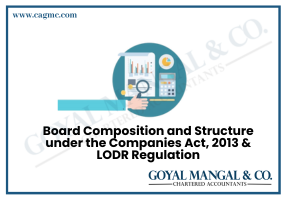
Have you ever come across the concept of minutes in company meetings? The maintenance of minutes is an essential task for every company under the Companies Act of 2013. The minutes of meetings contain important decisions, discussions, and actions taken by the company’s board of directors and shareholders. These minutes serve as a record of the company’s activities and provide an accurate account of the company’s decision-making process. In this article, we will discuss the concept and importance of maintenance of minutes under the Companies Act, 2013.
In this article, we will have a look at the concept and importance of maintenance of minutes under the Companies Act, 2013.
|
Table of Contents |
Concept of Maintenance of Minutes
Minutes are records in writing of the proceedings of a meeting. They provide a summary of the discussion, decisions, and actions taken during the meeting. Minutes are usually taken by the company secretary or any other person authorized by the board of directors.
Under the Companies Act, 2013, every company is required to maintain minutes of all its board meetings and general meetings. These minutes must be recorded in a book kept for that purpose and signed by the chairman of the meeting or by the chairman of the next meeting. The minutes must also be recorded in the minutes book within 30 days of the meeting.
Importance of Maintenance of Minutes under the Companies Act, 2013
The importance of maintenance of minutes under the Companies Act, 2013 involves various reasons, including the following:
- Compliance with the law: According to the Companies Act of 2013, every company must keep minutes of all its meetings. Failure to do so will attract penalties and legal action.
- Evidence in Legal Proceedings: Minutes serve as evidence in legal proceedings. They provide a record of the decisions and actions taken by the company and can be used as evidence in court if needed.
- Transparency: Minutes provide transparency to the company’s decision-making process. They help shareholders and other stakeholders to understand the company’s actions and decisions.
- Record of Progress: Minutes serve as a record of the company’s progress and activities. They provide an accurate account of the company’s decision-making process and can be used to track the company’s progress over time.
- Governance and Accountability: Minutes play a crucial role in corporate governance and accountability. They help ensure that the company’s decisions are made under the law and the company’s articles of association.
- Reference for Future Meetings: Minutes can be used as a reference for future meetings. They provide a record of past discussions and decisions, which can be useful when making future decisions.
- Protection of Directors and Officers: Minutes can protect the directors and officers in case of legal proceedings. They can help demonstrate that decisions were made in good faith and in the best interests of the company.
Recording Minutes
The meeting is conducted by the company secretary and in case there is no company secretary, any other person duly authorized by the board of directors or the chairman on this behalf.
- The minutes must contain a true and correct summary of the proceedings, which should be written in clear, concise, and simple language.
- If the decision of the Board is based on any unsigned documents, including reports or writings, or presentations made that are not a part of the agenda and appear in the minutes, such documents shall be identified by the company secretary or chairman.
- The minutes shall contain a specific reference to an earlier resolution or decision varied.
- The minutes of the last meeting of the Board shall be recorded at the board meeting held immediately after the date of entry of such minutes in the minutes book.
- The chairman ensures that the proceedings of the meeting are properly recorded.
- However, the Chairman has the authority not to remove from the minutes any matters that he reasonably deems to be considered defamatory against any person, irrelevant, or immaterial to the proceedings or the interests of the company.
Content of Minutes
The minutes of the meeting should contain the following details:
- The date, time, and venue of the meeting
- Names of the directors/committee members/shareholders present
- Names of the absent members
- Approval of previous minutes
- Matters discussed and decisions made
- Any dissents expressed
- Details of voting and the outcome of any vote
- Any action items or follow-up tasks assigned
- Signature of the chairman of the meeting
Finalization of the Minutes
Within 15 days of the meeting of the board or committee, the drafted minutes of the meeting will be sent to all the directors or committees for comments. Such minutes shall be served in person or by mail or by post by registered post or courier or email or any other recognized electronic means. Regardless of whether the directors attended the meeting or not, they will communicate their opinions regarding the minutes in writing within seven days from the date of distribution so that the minutes are completed and recorded in the minutes until the end of thirty days.
If any of the directors communicate their comments after the expiry of the specified period of seven days, the chairman may consider these comments. If no comment is passed by the director on the draft of the Minutes, it is considered that the draft has been approved by this director.
Penalties for Non-Compliance with Maintenance of Minutes
Non-compliance with the requirements for the maintenance of minutes can result in penalties and legal action against the company and its officers. This can include fines, imprisonment, disqualification, suspension of directors, and other legal consequences.
In case of non-compliance with the provisions regarding any meeting, the company will be fined twenty-five thousand rupees and the officers who are in default shall be fined five thousand rupees.
When a person is guilty of tampering with the minutes, he shall be punished with imprisonment for a term which may extend to two years and with a fine of twenty-five thousand rupees and extend up to one lakh rupees.
Key points to derive
The following key points related to the importance of maintenance of minutes under the Companies Act, 2013 can be considered-
- Every company shall adhere to the secretarial standards for general meetings and board meetings prescribed by the Central Government and the Institute of Company Secretaries of India composed under section 3 of the Company Secretaries Act, 1980 (56 of 1980).
- The dates of board and committee meetings held during the financial year should be disclosed in the company’s annual report together with the number of meetings attended by each director.
- The Company Secretary/ where there is no Company Secretary, any director duly authorized by the Board of Directors for the purpose, shall be the custodian of the minutes.
- A member of the Company is not entitled to inspect the minutes book.
Final words
In conclusion, the maintenance of minutes is a crucial task for every company. They serve as a record of the company’s activities, decision-making process, and progress. Minutes provide transparency, accountability, and governance to the company’s decision-making process. Failure to maintain minutes can result in penalties and legal action. Therefore, every company needs to ensure that minutes are maintained under the Companies Act of 2013. I hope you have got an insight into the importance of maintenance of minutes under the Companies Act, 2013.







